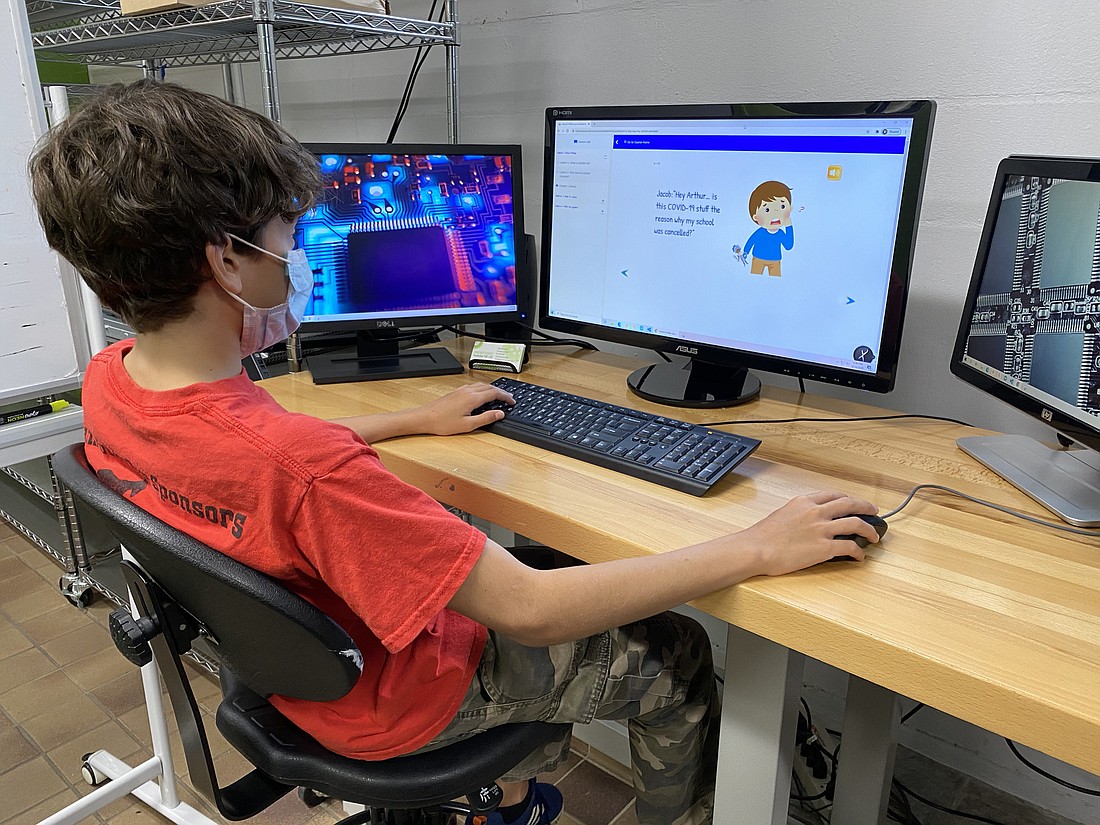- July 2, 2025
-
-
Loading

Loading

In most tales, knights fight evil kings, vikings and even dragons to win the day, but in one local fable, one brave knight fights COVID-19.
In a web application created by members of the Suncoast Science Center Faulhaber Fab Lab, Arthur the knight battles COVID-19. The online learning module was built like a storybook to help school students learn about the virus in easy-to-understand terms.
It was created by members of the lab’s Student Community Innovation Program, which provides high school and college students an opportunity to give back to their community by helping to solve a problem facing it. Members of the SCIP program are all enrolled in or graduated from Sarasota County Schools.
The 13-member education team, led by recent Brown University and Rhode Island School of Design graduate Mimi Faulhaber, partnered with Sarasota County Schools to create “COVIDucation,” which delivers factual information about the disease in elementary-aged terms.
“We wanted to give a broad understanding of what all of this means for kids,” Faulhaber said. “I think there’s not a lot of content out there that’s aimed for that age group.”
Throughout the storyline, kids learn what COVID-19 is, how it impacts people and how their actions can affect those around them. The goal, Faulhaber said, is to inform students without scaring them.
To create the app in eight weeks, the education team split into three groups: content, user interface/user experience and development.
The content team developed the storyline, drawing from Centers for Disease Control and Prevention guidelines and hospital research. The team also created the cartoon illustrations seen throughout the program.
The UI/UX team was tasked with building the look and feel of the website, while the development team wrote the code.
The students were paired with mentors from the community to help them along, but a bulk of the work was done by the SCIP students. And as if the time crunch wasn’t challenging enough, the members had to meet through Zoom to complete the project, but team member Naina Chauhan didn’t mind.
“It was really interesting to combine an aspect of community service and helping kids, especially students, because we’re working as students for students,” Chauhan said. “Many of us also got the opportunity to experience web design for the first time, because you don’t really learn that in school, so we got a unique learning experience and the chance to help kids.”
The students spoke with assistant superintendent and chief academic officer Laura Kingsley about the site early in the process, and Faulhaber said when the team brought the site back for approval, it was amazing to see the administrators’ reactions.
“Hearing them say, ‘We feel like this is really going to impact kids,’ and seeing how excited they were about it, and there was a need for it as opposed to making something and assuming people will use it, I thought that was really powerful,” Faulhaber said.
On top of positive reactions from the district, team members tested the site with some of the lab’s summer campers, all with positive reviews. A tutorial video and a website link was sent to the district’s elementary school principals.
No matter how many students end up using the site, developer Michael Gutierrez said he’s proud of the work he’s done and is happy if it helps just one child.
“It was a really valuable experience for me to be able to put these goals that I’ve had to work to benefit the community,” Gutierrez said. “Usually if I’m just sitting at home on my computer, I’m doing something that’s interesting to me, but doesn’t have an immediate impact on the real world. This truly helps people and I’m proud of that.”
Because information is always changing, the Fab Lab plans to have students continue building on the site in the future. For now though, parents and students can access the free lessons at http://COVIDucation.net.